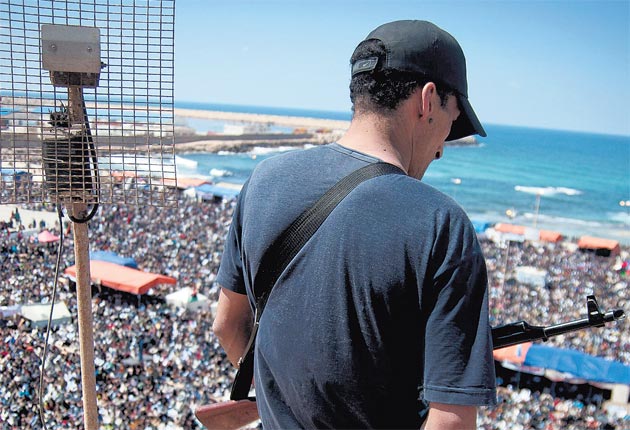Pressure on Obama to find exit plan as Nato’s lead role provokes rift

President Barack Obama was under growing pressure last night to explain how he would extricate the US from a third military campaign in the Islamic world, as splits within Nato ensured his country remained at the forefront of the Libyan bombing campaign.
Although the Pentagon maintains that its role is being scaled back, US aircraft carried out 67 of the 153 sorties undertaken by the coalition in the most recent 24 hours. With Nato planners talking about the no fly-zone lasting up to three months, US air and sea forces will be central to the mission.
Nato agreed on Thursday to replace the US in co-ordinating the imposition of the no-fly zone, but Turkish opposition prevented a deal on a unified command for the whole mission.
The convoluted deal raises the prospect that the operation would have a divided command structure, with the Americans continuing to run attacks on the ground forces of Muammar Gaddafi, and a Canadian general appointed yesterday to head the Nato operation.
Nato diplomats will negotiate through the weekend in an attempt to agree on rules of engagement that will allow the alliance to take command of all international military operations in Libya.
Turkey has complained that the strikes on Gaddafi's tanks go beyond the scope of the UN resolution while other Nato allies, led by Britain and France, insist their forces be given the flexibility to hit ground forces if they pose a threat to civilians.
The North Atlantic Council – Nato's main decision-making body, made up of ambassadors or ministers from all 28 allies – will have the final say on the running of the mission, with the addition of representatives from non-Nato coalition members such as Qatar and the United Arab Emirates.
Nato officials were confident yesterday an agreement could be reached on the rules of engagement that would place the whole operation under Nato's southern command in Naples, Italy. "Nato is actively considering whether to take on a broader role," said Oana Lungescu, an alliance spokeswoman. "We would expect a decision to take over all operations in the next few days," she added.
Even if Nato were formally in charge, the US is by far the alliance's most powerful member, and the operational change has not quelled demands in Washington for President Obama to explain the exact role of the US.
Polls indicate Americans are already lukewarm at best about the Libyan war, and if the Iraq and that support will only dwindle as the conflict drags on.
Top Republicans and some Democrats have complained that they have not been properly consulted. John Boehner, the House Speaker, criticised the "limited and sometimes contradictory case" for intervention made by the administration, and several potential Republican presidential candidates in 2012 have voiced similar criticism.
David Cameron, the Prime Minister, said in Brussels yesterday he was confident an agreement could be found that would see Nato providing the command-and-control machinery for attacks on the ground as well as making sure Gaddafi's airforce stays grounded.
Ken Clarke stokes fears of 'another lockerbie'
Kenneth Clarke has warned that Colonel Muammar Gaddafi could attempt another Lockerbie-style terror attack in revenge for British involvement in air attacks if he remains in power.
The Justice Secretary, above, acknowledged there was now a pressing security reason for ensuring the Libyan leader is forced out of office.
"We do have one particular interest in the Maghreb, which is Lockerbie," he said in a newspaper interview. The British people have reason to remember the curse of Gaddafi – Gaddafi back in power, the old Gaddafi looking for revenge, we have a real interest in preventing that."
He said the Government had little idea how long the conflict would last or what its outcome would be. "I am not in the Foreign Office, fortunately, so I am not too worried by my remarks. But I am still not totally convinced anyone knows where we are going now," he said.
Join our commenting forum
Join thought-provoking conversations, follow other Independent readers and see their replies
Comments
Bookmark popover
Removed from bookmarks